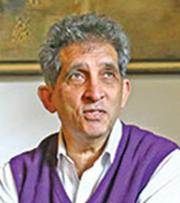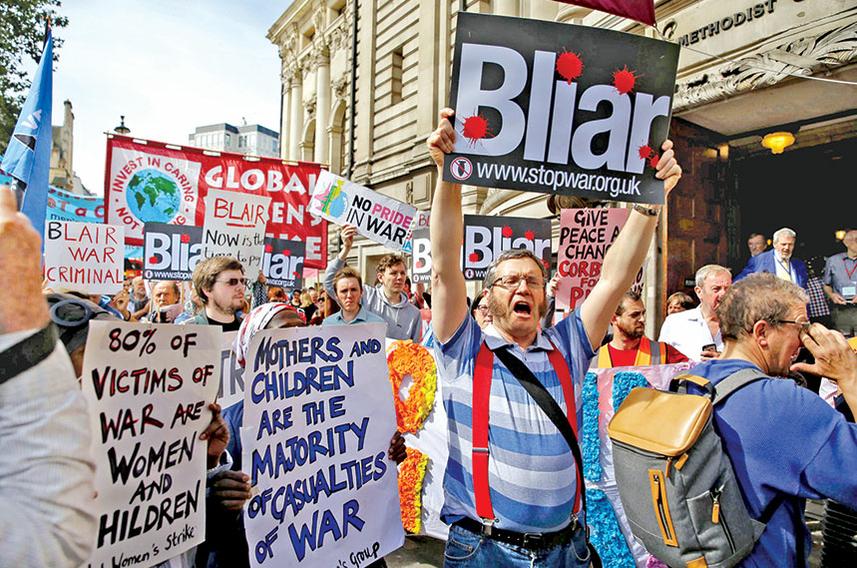
SHYAM BHATIA
Sir John Chilcot’s report on Britain’s war in Iraq reveals a style of decision-making in London that has more in common with authoritarian Asian regimes, including Indira Gandhi’s Emergency years, than what is expected from the Mother of Democracies.
Chilcot’s comments about Britain’s military participation to topple Saddam Hussein is also a searing indictment of a widely criticised conflict that continues to affect the wider international community. Many experts fervently believe that this 2003 war, and the circumstances leading up to it, paved the way for the rise of extremist groups like Al Qa’eda and ISIS — offshoots of the Taliban — that operate in Asia, including South Asia, and other parts of the world.
Britain was the junior partner in the war spearheaded by the US that further capitalised on support provided by NATO and Washington's other allies. But London’s backing in particular was key in helping to legitimise the invasion and later helping to police parts of the country after Saddam Hussein was toppled and executed.
A retired civil servant, Sir John Chilcot took seven years to prepare the report which is critical of British Prime Minister Tony Blair’s unqualified support for over-zealous US President George W. Bush when he promised him long before the invasion, “I will be with you, whatever.”
Chilcot agrees that Saddam Hussein was a brutal dictator who tortured and killed many of his own people, but nevertheless concludes that "the UK chose to join the invasion of Iraq long before the peaceful option for disarmament was exhausted. Military option at the time was not a last resort.”
His report is also critical of how Blair and his team did not prepare for the aftermath of the war, including the deaths of “at least 150,000 Iraqis". Chilcot comments, “The people of Iraq have suffered greatly.” Britain also suffered avoidable military post-war casualties because of bad post- war planning.
Commenting on the war and what it means for the families of 179 soldiers who died, former British Prime Minister David Cameron said, “sending our brave troops onto the battlefield without the right equipment was unacceptable”.
A spokesman for some of the families of the British military casualties has separately said they died “unnecessarily and without just cause and purpose”.
One of Chilcot’s most damaging conclusions is that there was no justification for Blair’s assertion in 2002 — one year before the invasion of Iraq — that Saddam continued to develop weapons of mass destruction, including chemical, biological and nuclear, that could be launched with only 45 minutes warning against British bases in the Mediterranean. Despite what the Iraqi authorities said at the time, Blair’s intelligence advisers claimed Iraq “continued to produce chemical and biological agents” and there had been “recent production”.
It was this key claim that Blair used to win support from fellow British parliamentarians who had lingering doubts about the wisdom of invading Iraq. They included the current Labour leader, Jeremy Corbyn, who opposed the war back in 2003 and who has now apologised on behalf of his Labour Party for “the disastrous decision to go to war.”
Chilcot says, “The Joint Intelligence Committee should have made clear to Mr Blair that the assessed intelligence had not established ‘beyond doubt’ that Iraq had continued to produce chemical and biological weapons and that efforts to develop nuclear weapons continued.”
For his part Blair has now accepted that intelligence assessments were wrong and post-war planning was poor. He has also apologised to the military families of those killed in 2003, adding he accepts they will “neither forget or forgive him".
“I feel deeply and sincerely in a way that no words can properly convey the grief and sorrow of those who lost ones they loved in Iraq — whether our armed forces, the armed forces of other nations or Iraqis," he said in response to the Chilcot findings.
“The intelligence assessments made at the time of going to war turned out to be wrong, the aftermath turned out to be more hostile, protracted and bloody than ever we imagined.... and a nation whose people we wanted to set free from the evil of Saddam became instead victims of sectarian terrorism. For all of this, I express more sorrow, regret and apology than you may ever know or can believe."
But, crucially, he has refused to apologise for going to war, saying the world was far better without Saddam, adding he would never agree “that those who died made their sacrifice in vain”. Even before the report was formally published Blair told an American television network, “I find it hard to apologise for removing Saddam. I think, even from today…. it is better that he’s not there than that he is there.”
Former British Liberal Democrat leader Sir Menzies Campbell said, “No matter what Tony Blair says or any criticisms there will be of him in the Chilcot Inquiry report, people have long since made up their minds. His partial acknowledgement that the military action against Saddam Hussein has made some contribution to instability in the Middle East will do nothing to change public opinion that his was a major error of judgement.The inevitable truth is that Iraq is his legacy and it will be his epitaph."
Other critics say Blair’s reluctance to make an unqualified apology is typical of his authoritative style of governance at the time that invokes comparisons with the high-handed policies of Asian leaders like Sheikh Hasina in Bangladesh and Indira Gandhi during the Emergency.
Unlike the worst years of Mrs Gandhi’s Emergency rule, Blair did not and could not respond to his political critics by sending them to jail. But those who dared to challenge him, whether politicians, journalists or others, were kept at a distance or shunned. Journalists who tried to look into his or his family’s personal life were warned of the consequences they would face if they continued.
The overall result was what critics called a ‘sofa’ style of governance where only a handful of the ‘great’ leaders’ personal advisers were allowed to participate or advise on key policy issues. Full-throated cabinet meetings and seeking consensus on key policy issues were not a hallmark of the Blair style of governance. Blair let it be known that he knew best and did not welcome those who questioned his judgement.
Unlike Mrs Gandhi and her immediate family, or at least as far as has been publicly revealed, Blair has also been much more clever about building up a personal fortune. Questions continue to be asked about how much personal cash Rajiv Gandhi may have accumulated through the Bofors deal, but nothing substantive has been proven. In Blair’s case reliable estimates put his personal fortune at between £40 and £60 million, all accumulated after he left office in 2007 and all assumed to be the results of contacts he made while Prime Minister.
Where Blair was less astute than Mrs Gandhi was his willingness to be associated with questionable political scenes that could limit the rights of ordinary British citizens. So there was a massive outcry when he tried to push through a scheme for introducing compulsory identity cards that would allow everyone to be followed and tracked by the authorities 24 hours a day. This scheme was dropped when Labour was eventually pushed out of power.
There were also protests when Blair seemed to back a scheme of compulsory repatriation of terror suspects to US and CIA black holes where they could remain without trial for years on end. All this is about Blair’s legacy about which questions are once again being asked following Chilcot. It must be reassuring for Asians in general and Indians in particular to realise that they are not the only ones who need to remain vigilant to preserve their hard won freedoms. The Magna Carta and the Indian experience of fighting for freedom have much in common to celebrate.
Comments
Currently there are no Comments. Be first to write a comment!




